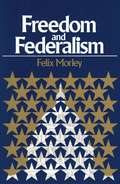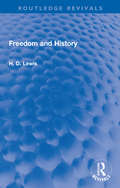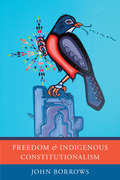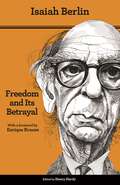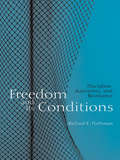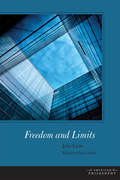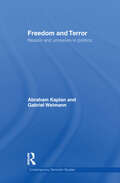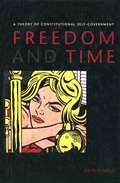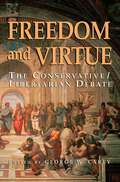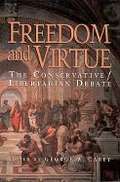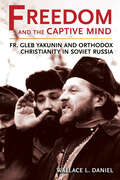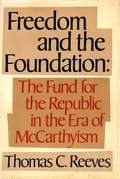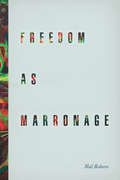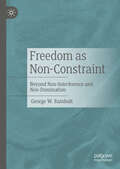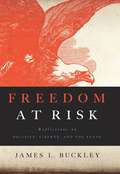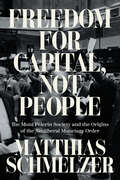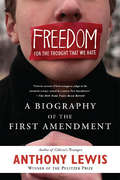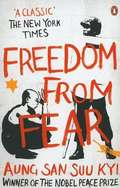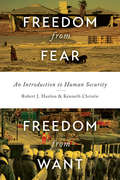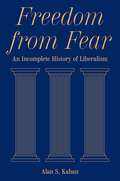- Table View
- List View
Freedom and Federalism
by Felix MorleyNo less relevant today, the book provides a perceptive diagnosis of the collapse of States' rights in modern America; and it seeks the restoration of a constitutional balance between central and state authorities.
Freedom and History (Routledge Revivals)
by H. D. LewisFirst published in 1962, Freedom and History expresses a deep concern about freedom and the way it is imperilled by misunderstandings. The cause of freedom has not always been well served by its friends; by presenting one -sided ideas of freedom they have often paved the way for extreme forms of collectivism and despotism. Professor Lewis examines works of T.H. Green and compares Green with Locke and Rousseau, to show how much the attitude of Green and other idealists to questions of education, the family, punishment, slavery, and war was affected by the individualism that underlay their thought and the failure to pay due heed to the facts of moral perplexity. This in turn is seen to owe much to the optimism of late nineteenth century thinkers and the belief in inevitable progress. The volume also discusses the nature of history, objectivity in history, religion and history, and law and morality. Author subjects the works of writers like Reinhold Niebuhr, Barbara Wootton, Ian Ramsey, Leonard Hodgson to close critical examination and presents his own ideas about the relation of theology to historical fact. This book will be an essential read for scholars and researchers of political philosophy, religion, theology, ethics, moral philosophy, and philosophy in general.
Freedom and Indigenous Constitutionalism
by John BorrowsIndigenous traditions can be uplifting, positive, and liberating forces when they are connected to living systems of thought and practice. Problems arise when they are treated as timeless models of unchanging truth that require unwavering deference and unquestioning obedience. Freedom and Indigenous Constitutionalism celebrates the emancipatory potential of Indigenous traditions, considers their value as the basis for good laws and good lives, and critiques the failure of Canadian constitutional traditions to recognize their significance. Demonstrating how Canada's constitutional structures marginalize Indigenous peoples' ability to exercise power in the real world, John Borrows uses Ojibwe law, stories, and principles to suggest alternative ways in which Indigenous peoples can work to enhance freedom. Among the stimulating issues he approaches are the democratic potential of civil disobedience, the hazards of applying originalism rather than living tree jurisprudence in the interpretation of Aboriginal and treaty rights, American legislative actions that could also animate Indigenous self-determination in Canada, and the opportunity for Indigenous governmental action to address violence against women.
Freedom and Its Betrayal: Six Enemies of Human Liberty - Updated Edition
by Isaiah BerlinThese celebrated lectures constitute one of Isaiah Berlin's most concise, accessible, and convincing presentations of his views on human freedom—views that later found expression in such famous works as "Two Concepts of Liberty" and were at the heart of his lifelong work on the Enlightenment and its critics. When they were broadcast on BBC radio in 1952, the lectures created a sensation and confirmed Berlin’s reputation as an intellectual who could speak to the public in an appealing and compelling way. A recording of only one of the lectures has survived, but Henry Hardy has recreated them all here from BBC transcripts and Berlin’s annotated drafts. Hardy has also added, as an appendix to this new edition, a revealing text of "Two Concepts" based on Berlin’s earliest surviving drafts, which throws light on some of the issues raised by the essay. And, in a new foreword, historian Enrique Krauze traces the origin of Berlin’s idea of negative freedom to his rejection of the notion that the creation of the State of Israel left Jews with only two choices: to emigrate to Israel or to renounce Jewish identity.
Freedom and Its Conditions: Discipline, Autonomy, and Resistance
by Richard FlathmanFirst published in 2003. Routledge is an imprint of Taylor & Francis, an informa company.
Freedom and Limits (American Philosophy)
by John LachsFreedom and Limits is a defense of the value of freedom in the context of human finitude. A contribution to the American tradition of philosophy, it focuses attention on moral problems as we encounter them in daily life, where the search for perfection and the incessant drive to meet obligations make it difficult to attain satisfaction. The book argues that uniformity is unproductive: Human natures are varied and changeable, making the effort to impose a unitary good on everyone futile. Moreover, we don’t need to strive for more than what is good enough: Finite achievements should be adequate to satisfy finite people.The ultimate aim of the book is to reclaim the role of philosophy as a guide to life. In doing so, it presents discussions of such important philosophers as Fichte, Hegel, Peirce, Dewey, James, and, above all, Santayana.
Freedom and Terror: Reason and Unreason in Politics (Contemporary Terrorism Studies)
by Gabriel Weimann Abraham KaplanThis book examines reason and unreason in the legal and political responses to terrorism. Terrorism is often perceived as sheer madness, unreasonable use of extreme violence and senseless, futile political action. These assertions are challenged by this book. Combining ‘traditional’ thought (by Kaplan) on reason and unreason in terrorism with empirical explorations of post-modern terrorism and its use of communication platforms (by Weimann) the work uses interdisciplinary and cross disciplinary dimensions to provide a multidimensional picture of critical issues in current politics and a deeper examination of their implications than previously available. The book looks at various aspects of modern politics, from terrorism to protest, from decision-making to political discourse, applying the perspective of philosophical thought. To do so, political issues and actions are examined by using concepts such as reason, emotions, madness, magic, morality, absolutism, extremism, psychopathology, rationality and others. The analysis is rooted in theories and concepts derived from history, philosophy, religion, art, sociology, psychology, and political science. This book, which was mostly written by the late Abraham Kaplan, an American philosopher, and edited and updated by Gabriel Weimann, will be of much interest to students of political violence/terrorism, philosophy, war and conflict studies and political science in general.
Freedom and Time: A Theory of Constitutional Self-Government
by Jed RubenfeldJed Rubenfeld addresses the issue of wanting to live in the present.
Freedom and Virtue: The Conservative Libertarian Debate
by George W. CareyThe long-running debates between between conservatives and libertarians are vigorous and highly charged, dealing with ideas about the very nature of liberty and morality. Like no other single work, Freedom and Virtue explores what unites and divides the adherents of these two important American traditions—shedding much light on our current political landscape.
Freedom and Virtue: The Conservative/Libertarian Debate
by George W. CareyThis book clearly indicates a widespread and intense concern about the relationship between freedom and virtue. This relationship is interesting to thoughtful students of virtually every political persuasion.
Freedom and the Captive Mind: Fr. Gleb Yakunin and Orthodox Christianity in Soviet Russia (NIU Series in Orthodox Christian Studies)
by Wallace L. DanielFreedom and the Captive Mind is a biography of Fr. Gleb Yakunin, the first Orthodox priest to adopt an ecumenical approach to Russian Orthodoxy, earning him the enmity of conservative groups within the Church and gratitude from other religious denominations. Father Yakunin believed the survival of the Church depended on its willingness to reform. When he was suspended, Yakunin continued to fight the system, working to expose the persecution of religious believers in the Soviet Union. After years of exile, Yakunin entered politics. He was criticized by religious authorities, denounced by nationalist politicians, and excommunicated by the Russian Orthodox Church. As Wallace L. Daniel demonstrates, the letters Yakunin wrote and his revelations about the relationship between the Church hierarchy and the KGB stand as monuments of courage and the determination to reveal the truth about abuses of power and the authoritarian mindset that predominated in both institutions.
Freedom and the Construction of Europe: Volume 1, Religious Freedom and Civil Liberty
by Quentin Skinner Martin Van GelderenFreedom, today perceived simply as a human right, was a continually contested idea in the early modern period. In Freedom and the Construction of Europe an international group of scholars explore the richness, diversity and complexity of thinking about freedom in the shaping of modernity. Volume 1 examines debates about religious and constitutional liberties, as well as exploring the tensions between free will and divine omnipotence across a continent of proliferating religious denominations. Volume 2 considers free persons and free states, examining differing views about freedom of thought and action and their relations to conceptions of citizenship. Debates about freedom have been fundamental to the construction of modern Europe, but represent a part of our intellectual heritage that is rarely examined in depth. These volumes provide materials for thinking in fresh ways not merely about the concept of freedom, but how it has come to be understood in our own time.
Freedom and the Construction of Europe: Volume 2, Free Persons and Free States
by Quentin Skinner Martin Van GelderenFreedom, today perceived simply as a human right, was a continually contested idea in the early modern period. In Freedom and the Construction of Europe an international group of scholars explore the richness, diversity and complexity of thinking about freedom in the shaping of modernity. Volume 1 examines debates about religious and constitutional liberties, as well as exploring the tensions between free will and divine omnipotence across a continent of proliferating religious denominations. Volume 2 considers free persons and free states, examining differing views about freedom of thought and action and their relations to conceptions of citizenship. Debates about freedom have been fundamental to the construction of modern Europe, but represent a part of our intellectual heritage that is rarely examined in depth. These volumes provide materials for thinking in fresh ways not merely about the concept of freedom, but how it has come to be understood in our own time.
Freedom and the Foundation: The Fund for the Republic in the Era of McCarthyism
by Thomas C. ReevesFreedom and the Foundation is a study in depth of the first and most controversial of the tax-exempt foundations dedicated to research and public education in the field of civil liberties and civil rights: The Fund for the Republic. The story of its struggle for survival, as Mr. Reeves demonstrates, exemplifies the broader conflict between America’s liberal and conservative forces in the early 1950s. The Fund—created in 1952 by the Ford Foundation—was set up to explore possibilities for liberalizing American society at the very time when, under the hysterical goading of Senator Joseph McCarthy, the forces of repression had reduced dissent to a hoarse whisper. Reeves tells of the mounting criticism when, less than two years after the Fund’s launching, the noted educator and thinker Robert Hutchins became its president. He shows how, as the Fund attempted to follow its mandate under the leadership of Hutchins and his vice-president, W.H. Ferry, it encountered vociferous and persistent attack from powerful and entirely predictable sources, and became a magnet for all the political crosscurrents of the day. With a subtle feeling for the atmosphere of the McCarthy era, the author carries the reader into the Fund’s first crisis, when it was brought before HUAC by the superpatriotic organizations and its other ultraconservative enemies. He describes the many clashes between Hutchins and his detractors in Congress and the press—such adversaries as Chairman Francis Walter of HUAC and the columnist-commentator Fulton Lewis, Jr. The account of the Fund’s inception and development, of its accomplishments in creating, sponsoring, and disseminating ideas useful to the nation—of its inner conflicts and politicking as well as its struggle to makes its way in the outside world—is not only fascinating in itself, but particularly timely in the light of the recent Congressional investigations of the tax-exempt foundations. Professor Reeves’s study is based on the files, reports, and publications of the Fund for the Republic (the first foundation to makes its complete files available to scholars), which are now at Princeton University, and on scores of interviews with Fund staff members, partisans, and critics, as well as more than five years of examining the more conventional source material.
Freedom and the Pursuit of Happiness
by Sebastiano Bavetta Pietro Navarra Dario MaimoneThis book is about the relationship between different concepts of freedom and happiness. The book's authors distinguish three concepts for which an empirical measure exists: opportunity to choose (negative freedom), capability to choose (positive freedom), and autonomy to choose (autonomy freedom). They also provide a comprehensive account of the relationship between freedom and well-being by comparing channels through which freedoms affect quality of life. The book also explores whether the different conceptions of freedom complement or replace each other in the determination of the level of well-being. In so doing, the authors make freedoms a tool for policy making and are able to say which conception is the most effective for well-being, as circumstances change. The results have implications for a justification of a free society: maximizing freedoms is good for its favorable consequences upon individual well-being, a fundamental value for the judgment of human advantage.
Freedom as Marronage
by Neil RobertsWhat is the opposite of freedom? In Freedom as Marronage, Neil Roberts answers this question with definitive force: slavery, and from there he unveils powerful new insights on the human condition as it has been understood between these poles. Crucial to his investigation is the concept of marronage--a form of slave escape that was an important aspect of Caribbean and Latin American slave systems. Examining this overlooked phenomenon--one of action from slavery and toward freedom--he deepens our understanding of freedom itself and the origin of our political ideals. Roberts examines the liminal and transitional space of slave escape in order to develop a theory of freedom as marronage, which contends that freedom is fundamentally located within this space--that it is a form of perpetual flight. He engages a stunning variety of writers, including Hannah Arendt, W. E. B. Du Bois, Angela Davis, Frederick Douglass, Samuel Taylor Coleridge, and the Rastafari, among others, to develop a compelling lens through which to interpret the quandaries of slavery, freedom, and politics that still confront us today. The result is a sophisticated, interdisciplinary work that unsettles the ways we think about freedom by always casting it in the light of its critical opposite.
Freedom as Marronage
by Neil RobertsWhat is the opposite of freedom? In Freedom as Marronage, Neil Roberts answers this question with definitive force: slavery, and from there he unveils powerful new insights on the human condition as it has been understood between these poles. Crucial to his investigation is the concept of marronage—a form of slave escape that was an important aspect of Caribbean and Latin American slave systems. Examining this overlooked phenomenon—one of action from slavery and toward freedom—he deepens our understanding of freedom itself and the origin of our political ideals. Roberts examines the liminal and transitional space of slave escape in order to develop a theory of freedom as marronage, which contends that freedom is fundamentally located within this space—that it is a form of perpetual flight. He engages a stunning variety of writers, including Hannah Arendt, W. E. B. Du Bois, Angela Davis, Frederick Douglass, Samuel Taylor Coleridge, and the Rastafari, among others, to develop a compelling lens through which to interpret the quandaries of slavery, freedom, and politics that still confront us today. The result is a sophisticated, interdisciplinary work that unsettles the ways we think about freedom by always casting it in the light of its critical opposite.
Freedom as Non-Constraint: Beyond Non-Interference and Non-Domination
by George W. RainboltWhen is a person free to do something? The focus of much of the recent work on this question has been the debate between those who defend freedom as non-interference (aka liberals) and those who defend freedom as non-domination (aka republicans). This book defends a new answer to this question, freedom as non-constraint. According to freedom as non-constraint, both interference and domination cause unfreedom, both human and natural constraints cause unfreedom, and both controlled and uncontrolled interference cause unfreedom. Compared to liberal and republican theories, freedom as non-constraint provides a better account of systemic and structural threats to freedom, a better picture of how market forces and governments impact freedom, and a better understanding of how the natural world constrains freedom. Freedom as non-constraint also provides a new account of the scalarity of freedom and points to the limits on our ability to measure freedom with precision.
Freedom at Risk
by James L BuckleyJames L. Buckley may be the only American alive who has held high office in each branch of the federal government as senator of New York, undersecretary of state under Ronald Reagan, and a judge on the U.S. Court of Appeals for the D.C. Circuit. His unique understanding of how Washington works equips him to address the intrusive and exponential growth of the federal government in the past forty years.In Freedom at Risk, Buckley's collected essays, musings, and speeches tell the real story of why government is incapable of managing an economy, and why the transformation of the federal government into a centrally administered welfare state is undermining the critical safeguards that the Founders wrote into the Constitution.Here, in a sober book of perceptive analysis spanning a lifetime in Washington, lies an outline of the steps that must be taken to save constitutional government, if that is still possible.
Freedom for Capital, Not People: The Mont Pèlerin Society and the Origins of the Neoliberal Monetary Order
by Matthias SchmelzerThe definitive history of neoliberal monetary thoughtBased on new archival sources, Freedom for Capital, Not People tells the story of how the Mont Pèlerin Society transformed the world economy. Founded in 1947 by economist Friedrich von Hayek, by the turn of the 1970s the society commanded influence at the highest levels of international monetary policy – with debates sparked by Hayek, Milton Friedman and Ludwig von Mises emigrating from the seminar room to the halls of power. The group&’s collective agenda, the result of years of fierce argument and shrewd political strategising, would dominate the next half century of global capitalism.
Freedom for Sale: Why the World Is Trading Democracy for Security
by John KampfnerDemocratic liberalism v. authoritarianism - the ideological divide that defined the twentieth century. But when the cold war ended, "the end of history" was proclaimed. Soon the fire of freedom would burn worldwide, the experts said. And where markets were freed, human rights would inevitably follow. Or not. In the last twenty years, nations including India, Russia, China and the United Arab Emirates have disproved the idea that capitalism and democracy are inextricably linked. Emerging middle classes have proven themselves all too willing to sacrifice certain democratic rights - including free speech, an open media, and free elections - in exchange for prosperity. But they are not alone. We are all doing it. Alarmingly, Western democracy has adopted some of the attributes of that authoritarianism. Combining boots on the ground reporting with incisive analysis, award-winning journalist John Kampfner describes this alarming trend - one which has only been exacerbated by the global economic meltdown - and what citizens must do to counter it.
Freedom for the Thought That We Hate: A Biography of the First Amendment
by Anthony LewisMore than any other people on earth, we Americans are free to say and write what we think. The press can air the secrets of government, the corporate boardroom, or the bedroom with little fear of punishment or penalty. This extraordinary freedom results not from America’s culture of tolerance, but from fourteen words in the constitution: the free expression clauses of the First Amendment. In Freedom for the Thought That We Hate, two-time Pulitzer Prize-winner Anthony Lewis describes how our free-speech rights were created in five distinct areas--political speech, artistic expression, libel, commercial speech, and unusual forms of expression such as T-shirts and campaign spending. It is a story of hard choices, heroic judges, and the fascinating and eccentric defendants who forced the legal system to come face to face with one of America’s great founding ideas.
Freedom from Fear
by Aung San Suu KyiAung San Suu Kyi, human-rights activist and leader of Burma's National League for Democracy, was detained in 1989 by SLORC, the ruling military junta. . This collection of writings reflects Aung San Suu Kyi's greatest hopes and fears for her people and her concern about the need for international cooperation, and gives poignant and humorous reminiscences as well as independent assessments of her role in politics. Containing speeches, letters and interviews, these writings give a voice to Burma's 'woman of destiny', who was awarded the Sakharov Prize for Freedom of Thought and the 1991 Nobel Peace Prize.
Freedom from Fear, Freedom from Want: An Introduction To Human Security
by Kenneth Christie Robert J. HanlonAdopting an interdisciplinary perspective, Freedom from Fear, Freedom from Want is a brief introduction to human security, conflict, and development. The book analyzes such key human security issues as climate change, crimes against humanity, humanitarian intervention, international law, poverty, terrorism, and transnational crime, among others. The authors encourage readers to critically assess emerging threats while evaluating potential mechanisms of deterrence such as conflict resolution, economic development, diplomacy, peacekeeping, international law, and restorative justice. Concise yet comprehensive, Freedom from Fear, Freedom from Want is an ideal text for human security courses.
Freedom from Fear: An Incomplete History of Liberalism
by Alan S. KahanA provocative new history of liberalism that also provides a road map for today’s liberalsFreedom from Fear offers a striking new account of the dominant political and social theory of our time: liberalism. In a pathbreaking reframing of the historical debate, Alan Kahan charts the development of Western liberalism from the late eighteenth century to the present. Examining key liberal thinkers and issues, Kahan shows how liberalism is both a response to fear and a source of hope: the search for a world in which no one need be afraid.Freedom from Fear reveals how liberal arguments typically rely on three pillars: freedom, markets, and morals. But when liberals ignore one or more of these pillars, their arguments generally fail to persuade. Extending from Adam Smith and Montesquieu to today’s battles between liberals and populists, the book examines the twists and turns of the “incomplete” or unfinished liberal tradition while demonstrating its fundamental continuity. It combines fresh accounts of familiar figures such as Tocqueville and Rawls with discussions of less-famous but pivotal thinkers such as A. V. Dicey and Jane Addams, and explores how liberals have dealt with crucial issues, from debates over male and female suffrage to colonialism and liberal anti-Catholicism.By transforming our understanding of the history of liberal thought and practice, Freedom from Fear provides a new picture of the political creed today: the paths liberals need to follow, the questions they need to answer, and the dead ends they must avoid—if they are to win.
